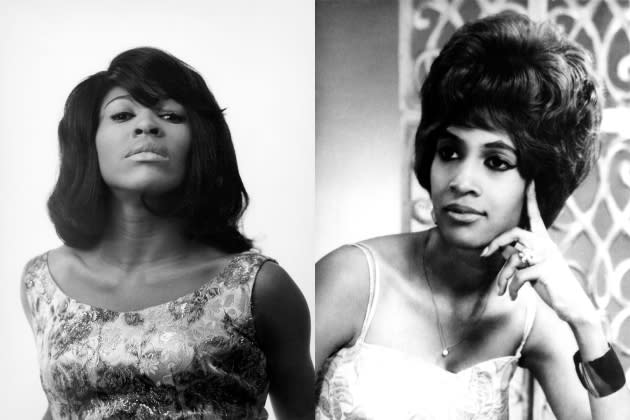Original Ikettes Member Robbie Montgomery Recalls Sister-like Bond with Tina Turner
- Oops!Something went wrong.Please try again later.

Robbie Montgomery experienced the intense, demanding management style of Ike Turner firsthand. As one of the original Ikettes of the Ike & Tina Turner Revue, she provided dreamy background vocals and dazzling choreography to the stage show — and also provided the future Queen of Rock & Roll with a confidante during her abusive relationship with Ike.
“Tina was like a sister to me. We would try to get her to leave. We talked about it all the time, every time it happened,” Montgomery tells Rolling Stone. “Even though it didn’t happen in front of us, we knew what happened.”
More from Rolling Stone
Following Turner’s death on May 24, at age 83, Montgomery — in her own words — recalls their shared dreams of becoming stars and how Turner held on to a fortune teller’s message of hope during her turbulent relationship with Ike.
When I first met Tina, Ike was looking for girls to sing background on the song “A Fool in Love.” Back in those days, her name was “Little Ann.” That was one of Ike’s things, he used “Little” for everybody. We had an instant connection. I was sort of the crazy, funny one and she was looking for a laugh. She had a real healthy, bust-out laugh.
She never thought she was a great singer. During those times there were the Diana Rosses and people with the pretty voices — she didn’t have that, she was a rough singer. [But] she was a great performer. Nobody could do it like her. She was an entertainer from her heart.
We were all 21, trying to make it. We were excited, didn’t know what we were doing. There were maybe three revues out during that time: James Brown, Bobby “Blue” Bland, and Ike and Tina. Ike was very serious. We would rehearse all the way in the car, rehearse in hotels. We would rehearse any place that he called a rehearsal.
We didn’t realize we were making history because a lot of it wasn’t that glamorous. We went to our gigs, traveled by bus, went to the hotel, rehearsed, and the next morning did the same thing, over and over again. It was just trying to keep surviving and working, focusing on becoming the best. We would make up our choreography, we would pick our own clothes and rip them up. We always wore short, short dresses but we dreamed of the day that we were wearing gowns because there was a different element to us when we wore gowns. We always imagined being at Carnegie Hall. We had all these fantasies.
I’ll never forget this reader named Jenny told Tina back in the Sixties that she would live in Europe and she would marry somebody there. She held on to that. She was looking for hope and that was it: getting married and a better life. Even though people thought she was a star, she was unhappy.
The Ikettes realized that we would never become stars working with Ike because he kept everybody in the back. Us leaving Tina was a devastating time in all of our lives, all three Ikettes. I think Ike had Tina brainwashed because he said everybody he had taken and made a star out of, Jackie Brenston and all those other entertainers, had left him. She felt obligated to stay, thinking that if he got big that she would be able to leave. She was a strong-willed woman and she always said, “In due time I will be leaving.”
We always kept in contact, even after I stopped singing. I would put background vocals on her on Ike and Tina songs. We never really severed our relationship until she moved to Switzerland and then [Tina’s sister and Ikettes manager] Alline died. I did go to her last concert in L.A. and to Alline’s funeral. That was basically the last time I saw her except during the time that she said something about me on Oprah’s show. I cried when I heard her say, “I don’t mean to cry, Robbie.” I always felt guilty by leaving her there, even though I did what was best for me.
Back in the day, you didn’t know what a person was going through behind doors. Nobody talked about it. Eventually, she came out and told her story. People saw what happened to her and how she rebounded. It was inspiring to a lot of women — even though your past might be muddied up, you can overcome it. I was happy for her, proud with my chest sticking out. This was my friend and she was doing well, and I was glad because of where she came from. It always inspired me: If she’s still doing it, maybe one day I’ll be able to do it.
“The Best” was the [song] that reminded me of her because she was simply the best. She took what she had and did it like nobody else could. A lot of things I won’t tell because I didn’t talk about it when she was alive, and I won’t talk about them now. I will always love her, I will always cherish her, and she will truly be missed. The bond that we have will always be in my heart.
Best of Rolling Stone
